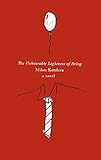So, it’s the early hours of the morning and I’m fast asleep. I dream the following:
I’m in an empty restaurant, deep in conversation with someone I’d never met before. Even in the dream, this person is meant to be a stranger – a Millions reader named Oliver. (I had recently watched a new BBC version of Oliver Twist, though the person in my dream was in no way urchinlike).
 He is relating to me the fascinating and sordid details of his life. After a pause, I proclaim to Oliver that I know what his “formative novel” would be: The Unbearable Lightness of Being by Milan Kundera. Though I’ve never actually heard the phrase “formative novel” before, I seemed to imply a novel whose spirit and tone most closely impacted the life that dream-Oliver would go on to lead. Not so much the plot of the novel, and not the author’s autobiography. I was apparently matching up the tone of the book with the tone of the reader’s subsequent life.
He is relating to me the fascinating and sordid details of his life. After a pause, I proclaim to Oliver that I know what his “formative novel” would be: The Unbearable Lightness of Being by Milan Kundera. Though I’ve never actually heard the phrase “formative novel” before, I seemed to imply a novel whose spirit and tone most closely impacted the life that dream-Oliver would go on to lead. Not so much the plot of the novel, and not the author’s autobiography. I was apparently matching up the tone of the book with the tone of the reader’s subsequent life.
I then went on to tell Oliver that my Millions colleague Garth’s “formative novel” would be David Foster Wallace’s Infinite Jest. (I don’t know this to be true. I suspect that Garth’s passionate appreciation of David Foster Wallace planted the notion in my head several months ago. Nevertheless, dream-Garth’s “formative novel” was Infinite Jest).
Oliver then asks me what my “formative novel” would be. I contemplate for a moment and then respond: A Confederacy of Dunces by John Kennedy Toole. This is a curious choice as I hadn’t read it until about five years ago, when I was already well into my 30s. Still, the accessibly off-kilter humor of the novel does seem a good fit. Had I read it at an impressionable age, I suspect that it would qualify as a close match for the tone of my subsequent adult personality.
The dream then took an odd turn. I was lying on my back on the sidewalk, still in conversation with Oliver, as a pack of schoolchildren and their teacher hurdled over me, never once looking down or stepping on me.
Oliver then morphed into Jack Lemmon, circa The Apartment, and I jolted awake, and reached for a notebook and pen.
So: what would your “formative novel” be? This requires not just a reading of the novel, but a certain amount of self-awareness. Try to match the tone of the novel with the tone of your life or of your personality. I guess it doesn’t matter when you read it. It’s fine if you read it later in life and retroactively match it up with your life. And, Garth, feel free to set the record straight.








